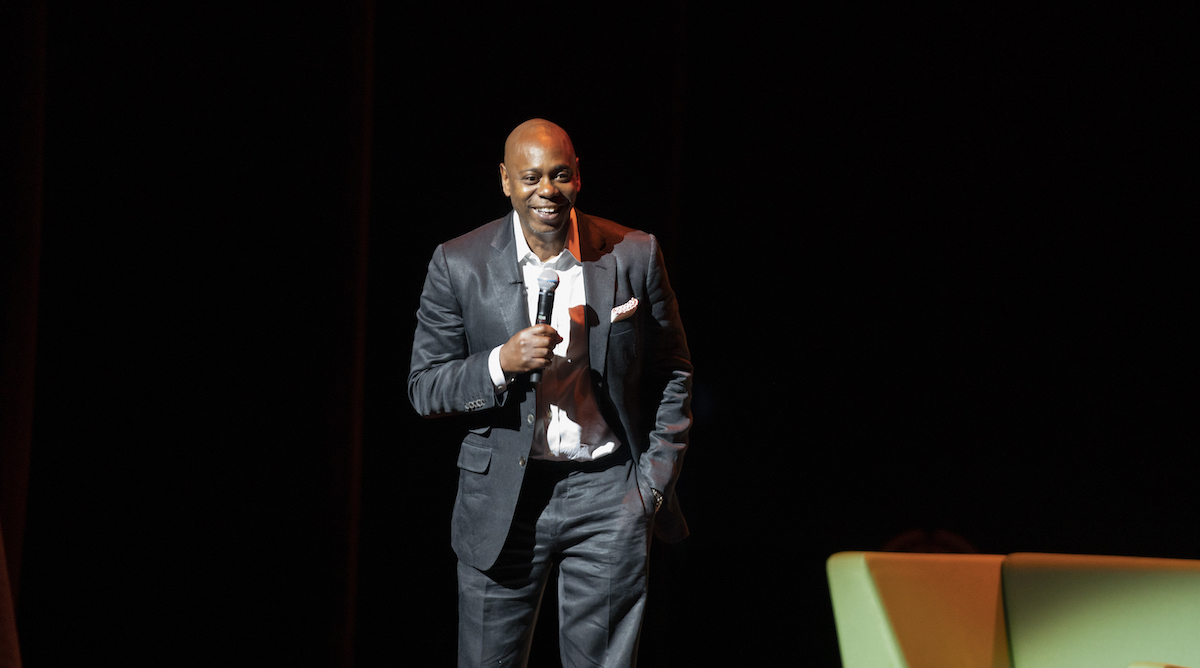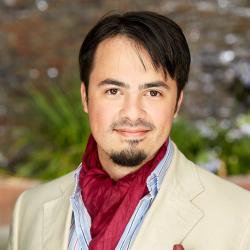The best comedian America has produced in the post–Cold War era is Dave Chappelle, and if you listen to his new Netflix show, What’s in a Name: Speech at Duke Ellington School of the Arts, he’ll tell you that himself. I suppose it’s not bragging if it’s true, but it’s unusual for celebrities to proclaim the power they have over America, which usually cause it to be dispelled (think John Lennon’s “bigger than Jesus” comment). For my part, I like Chappelle’s confidence—he at least sounds manlier than all the celebrities complaining about life’s injustices.
Chappelle feels he needs to assert some kind of authority after spending the past couple of years in fear that his home, progressive America, is trying to destroy him, his career, and his legacy because of its commitment to transgender ideology. Chappelle likes to make jokes and, as a progressive himself, a believer in all the group identities proliferating in elite institutions, seems to believe you can kid people out of their prejudices. Unfortunately for him, he has discovered that for all his self-importance, he has run into something more terrifying than the injustices he complains about in his comedy. After all, historical troubles don’t threaten his career or, indeed, that of any other comic, given the American belief in freedom of speech and First Amendment jurisprudence that has protected artists until the wokies came along.
Last October, Chappelle published The Closer on Netflix, the last of his six-year, six-show deal with the streaming service, and had yet another amazing success. Everything he’s done has been watched by tens or hundreds of millions of people, and one expects that everyone involved is making fortune after fortune. Unfortunately for him, that doesn’t matter to our liberal elites—or rather, they hate it and they hate him for being popular, because they would like to impose totalitarian rule over the American mind and it’s proving unusually difficult to do with Chappelle speaking up for commonsense doubts and worries about transgender ideology. Chappelle has raised doubts in his act that hysterical activists have any claim to be heard on this issue—in The Closer, he pointed out that such people drove one of his transgender friends, a comedian he had helped professionally and got along with swell personally, to suicide. He’s making liberal conformism look both hysterical and despotic and more than a little suspicious morally and intellectually.
Liberal elites have reacted by denying his talent, by accusing him of fomenting violence through his words, and by attempting to ruin him, including through a media-fueled moralistic attack by Netflix employees on the corporation’s deal with Chappelle, which happily failed in getting him kicked off the platform.
Last November, the woke scolds had more success at his alma mater, a D.C. high school mostly for black kids, the Duke Ellington School of the Arts. Chappelle was supposed to return there to be applauded and dispense wisdom to some 600 aspiring artists, having accepted the school’s offer to name a theater for him in the hope of achieving fundraising goals and giving it, ostensibly, much-needed prestige. Instead, students were hysterical about his Closer special, indeed denunciatory on pretended moral grounds, and incredibly foolish, the way only the willing tools of liberal ideology can be. As a result, Chappelle was humiliated and withdrew his name from consideration for the new theater, all the while exhibiting the fabled liberal tolerance in reminding everyone that these are just misguided kids in the hands of media manipulation.
But he didn’t give up the fight and last month he returned to the school to give a 40-minute speech that was much better received (and is the subject of this new special). I guess they didn’t allow activists in this time; indeed, to watch the show you might even hope that that educational institution has in fact not been overtaken by woke despotism, but I myself am skeptical. Chappelle talks about how his youthful ambition to become a comedian started in his D.C. neighborhood barbershop, led him to comedy clubs, and then a high school for the arts, to learn how to act, which changed his life both by giving him an education in the general sense, allowing him to develop his natural talent, and by giving him a strength of character to never compromise his beliefs.
Chappelle now sounds like the most despised creature in our public life, an old-fashioned conservative: grumpy, defensive of some fond delusion concerning decency or manners, increasingly devoid of glamour, constantly complaining about kids who show no respect or don’t work hard enough or don’t remember what it was like back in the day, etc., etc. Indeed, What’s in a Name is really his sketch of a bildungsroman, or “self-portrait of the artist as a young man.” As a professional autobiography, it is a fairly dignified answer to the contemptible genre of celebrity commencement speeches of the last generation. He talks about the help he received from generous yet harsh teachers who had authority and could afford to show kindness, and from an institution intent on teaching kids however it might hurt their feelings yet that allowed them the privacy required to make daring decisions.
I know the kind of teacher he has in mind and I understand that he means to extend authority from parents to education, to remind his audience that a school has to resemble a family. What is more reasonable than that the old should have authority over the young? Chappelle has recently talked more and more about the debt he owes his own parents for educating him to achieve his unusual success. Yet he is in no position to impose such an authority on anybody, and neither the young nor liberal elites will listen, given that, apparently, their only path to success is to destroy both him and the American freedom he has belatedly decided to stand for. Indeed, the very basis of his appeal from weakened educational institutions to the natural authority of the family is in danger. Chappelle talks about how he became serious about his work by becoming a husband and a father. What could this mean to the young now, rich or poor, who don’t have much family, aren’t married, and rarely have kids, and this in unprecedented numbers?
Perhaps seeing the weakness of both the family and the school, the communities that make private life in America tolerable if not happy, Chappelle changes his argument in the course of What’s in a Name to its final, far more individualistic form, to stand on the ground of “artistic freedom and expression,” his chosen new name for the theater. So his appeal to his own celebrity is much more of a last stand than an introduction to some impressive new plan.
I’m not sure whether the title of his speech/special is a reference to his own name, now spat upon with frequency, or to the change of names insisted on by transgender discourse, the new commandment of the only faith that can animate American elites in our time. Chappelle seems fairly confident that he’s an adult, a man—strong, reasonable, and charitable to others—superior yet always helping. In the context of elite America, he really is a noble man and I am for him. He might end up a martyr, but I’m not quite sure a martyr to what. Art is not enshrined in the U.S. Constitution and doesn’t command much respect in our public life. Artists don’t change the ideologies of our parties or the preferences of the electorate.
The First Amendment defends not the scandals of entertainment but the core of our private and public lives, religion and politics, which naturally involves speech and disagreement. Chappelle, who turned to Islam in his moment of worst public humiliation, should know that. Comparatively, comedy is unimportant, not to say defenseless. He speaks almost as a politician—what we call a public figure or a leader—not as an artist when he makes his serious rather than comic argument. But what is his party? Does he not lose his art the moment his adversaries compel him to abandon comedy and argue with a straight face? Inspirational speeches are all the rage in our times, but they are artless, dubious, and short-lived. His argument doesn’t even explain why a man with his beliefs would be a comic, except by suggesting he wants to somehow transform America into a more just regime, yet without confronting either the people or the elites, with whom he actually identifies to a great extent. This is bound to fail and, precisely by aiming at justice and not the joke, helps put an end to comedy, an art already almost lost in America.

